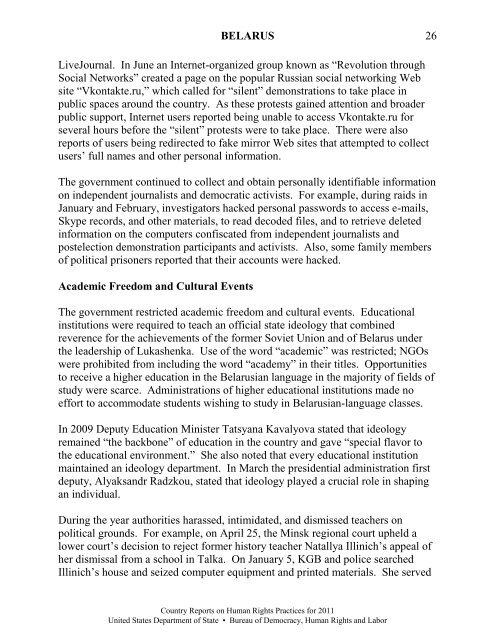belarus executive summary - US Department of State
belarus executive summary - US Department of State
belarus executive summary - US Department of State
You also want an ePaper? Increase the reach of your titles
YUMPU automatically turns print PDFs into web optimized ePapers that Google loves.
BELAR<strong>US</strong> 26<br />
LiveJournal. In June an Internet-organized group known as “Revolution through<br />
Social Networks” created a page on the popular Russian social networking Web<br />
site “Vkontakte.ru,” which called for “silent” demonstrations to take place in<br />
public spaces around the country. As these protests gained attention and broader<br />
public support, Internet users reported being unable to access Vkontakte.ru for<br />
several hours before the “silent” protests were to take place. There were also<br />
reports <strong>of</strong> users being redirected to fake mirror Web sites that attempted to collect<br />
users’ full names and other personal information.<br />
The government continued to collect and obtain personally identifiable information<br />
on independent journalists and democratic activists. For example, during raids in<br />
January and February, investigators hacked personal passwords to access e-mails,<br />
Skype records, and other materials, to read decoded files, and to retrieve deleted<br />
information on the computers confiscated from independent journalists and<br />
postelection demonstration participants and activists. Also, some family members<br />
<strong>of</strong> political prisoners reported that their accounts were hacked.<br />
Academic Freedom and Cultural Events<br />
The government restricted academic freedom and cultural events. Educational<br />
institutions were required to teach an <strong>of</strong>ficial state ideology that combined<br />
reverence for the achievements <strong>of</strong> the former Soviet Union and <strong>of</strong> Belarus under<br />
the leadership <strong>of</strong> Lukashenka. Use <strong>of</strong> the word “academic” was restricted; NGOs<br />
were prohibited from including the word “academy” in their titles. Opportunities<br />
to receive a higher education in the Belarusian language in the majority <strong>of</strong> fields <strong>of</strong><br />
study were scarce. Administrations <strong>of</strong> higher educational institutions made no<br />
effort to accommodate students wishing to study in Belarusian-language classes.<br />
In 2009 Deputy Education Minister Tatsyana Kavalyova stated that ideology<br />
remained “the backbone” <strong>of</strong> education in the country and gave “special flavor to<br />
the educational environment.” She also noted that every educational institution<br />
maintained an ideology department. In March the presidential administration first<br />
deputy, Alyaksandr Radzkou, stated that ideology played a crucial role in shaping<br />
an individual.<br />
During the year authorities harassed, intimidated, and dismissed teachers on<br />
political grounds. For example, on April 25, the Minsk regional court upheld a<br />
lower court’s decision to reject former history teacher Natallya Illinich’s appeal <strong>of</strong><br />
her dismissal from a school in Talka. On January 5, KGB and police searched<br />
Illinich’s house and seized computer equipment and printed materials. She served<br />
Country Reports on Human Rights Practices for 2011<br />
United <strong>State</strong>s <strong>Department</strong> <strong>of</strong> <strong>State</strong> • Bureau <strong>of</strong> Democracy, Human Rights and Labor
















